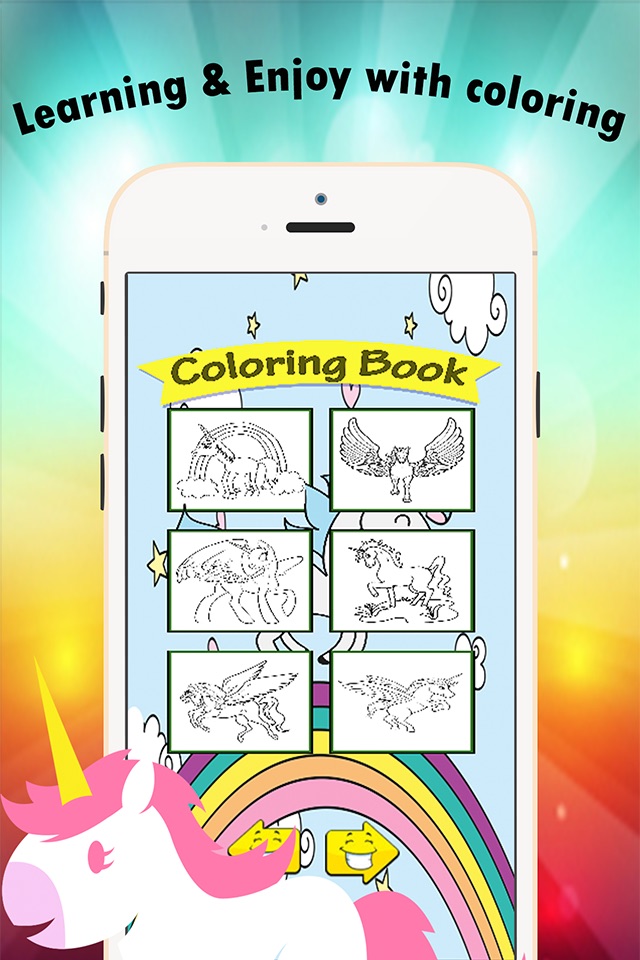
My Unicorn Coloring Book for children age 1-10: Games free for Learn to use finger to drawing or coloring with each coloring pages
Lets get fun with these Unicorn Coloring Book | Coloring Free Games for Kids Boy and Girls reading and preschool educational for toddlers by Kids Academy.
Painting & Coloring Book give you a great time in summer, very fun for your kids and improvement for Creativity & Life skills.
Use finger paint or watercolor to show how two colors can be mixed together to produce a third color. Mixing paint helps children learn about colors and shades. Ask your child what he thinks will happen if you mix a color with white paint. Learning is messy—but it’s also great fun!
At this age, painting is a multi-sensory experience rather than a purely visual one. In other words, your toddler may be more interested in how the paint feels squishing between his chubby fingers than the finished "artwork."
When children color, they strengthen the small muscles in their hands that help them learn to write. Encourage children to color by providing lots of access to coloring pages.
BENEFITS OF COLORING PAGES:
There’s a simple activity that helps children to develop cognitively, psychologically and creatively: coloring. They love to do it anyway, and it could lead to a healthier, happier life in adolescence and into adulthood. The following are some of the key benefits of coloring pages in kids’ psychology and development:
- Improves Motor Skills
- Prepares Them for School
- Stimulates Creativity
- Contributes to Better Handwriting
- Color Awareness, Recognition and Discernment
- Improved Focus and Hand to Eye Coordination
- Boundaries, Structure and Spacial Awareness
- Improved Confidence and Self Esteem
- Self-Expression
- Therapy and Stress Relief
- Focus
Coloring pages are a wonderful recreational activity for kids, but there are also some great educational and developmental benefits to coloring pictures:
- Consistent use of coloring pages and coloring worksheets helps children develop fine motor skills, which in turn helps kids develop a strong pencil grip, improved writing skills, and good penmanship.
- Children who learn to work on coloring pages for kids while ignoring the surrounding noise and activity develop great focusing skills that can help in the classroom and beyond.
- Color a coloring page or two with your child to create some quiet time where your can discuss your days and thoughts. Sometimes, kids will hint at their feelings though coloring worksheets—a child that uses all dark colors may be feeling glum, and a child that focuses on a certain object in the picture might have an interest in that subject. Use coloring pages as a starting point for a discussion with your child.
- Coloring pages are also a great creativity builder for kids. Many kids will learn how to replicate colors and images that they find in the real world through coloring worksheets, and they can also learn how to create a surreal or silly picture through colors that express exactly how they feel.
A coloring book (or colouring book, or colouring page) is a type of book containing line art to which a reader may add color using crayons, colored pencils, marker pens, paint or other artistic media. Traditional coloring books and coloring pages are printed on paper or card. Some coloring books have perforated edges so their pages can be removed from the books and used as individual sheets. Others may include a story line and so are intended to be left intact. Today many childrens coloring books feature popular cartoon characters. They are often used as promotional materials for animated motion pictures. Coloring books may also incorporate other activities such as connect the dots, mazes and other puzzles. Some coloring books also incorporate the use of stickers
Coloring books are widely used in schooling for young children for various reasons. For example, children are often more interested in coloring books rather than using other learning methods; pictures may also be more memorable than simply words.



